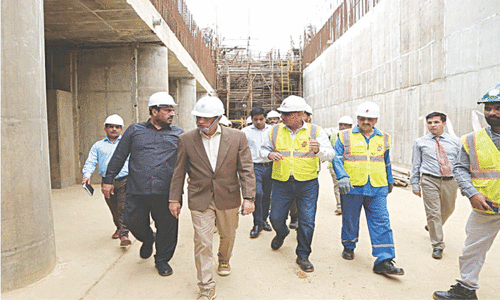KARACHI: Discussing the role of the state in providing social protection services, speakers at a programme held on Monday recommended that the government increase budgetary allocation for social protection from 0.2 per cent to at least 2pc of the GDP (Gross Domestic Product), make relevant schemes inclusive of all workers and give priority to rights-based schemes rather than welfare schemes.
Jointly organised by the National Commission for Human Rights (NCHR) and National Organisation for Working Communities (NOW), the meeting was held at the commission’s office.
Highlighting the need for a consultation on social protection policies, Anis Haroon representing the NCHR said that more than half of Pakistan’s population lived below the poverty line and majority of the people were deprived of basic necessities of life.
These conditions, she pointed out, indicated a greater need for an efficient social protection system, which was the state’s prime responsibility under the Constitution.
“The GSP (Generalised System of Preference) plus status, which Pakistan has received, also requires implementation of all international conventions related to human rights, be they labour rights or minorities’ rights,” she noted, adding that the government could not extend social security to all and there was a need for evaluating performance of the organisations working for social protection.
Giving a presentation on the subject, Zeenat Hisam, an independent researcher, referred to a number of relevant laws enacted at the federal and provincial level. Pointing out flaws in the contributory social protection schemes, for instance, Employees Old-age Benefit Institution, Sindh Employees’ Social Security Institution and WWF (the pension and workers welfare fund), she said: “Their coverage is limited as they do not cover a large number of workers in the informal sector that includes domestic and home-based workers, agricultural workers, transport and construction workers. Also, the amount of benefits is inadequate and often employers tend to avoid registration of workers.”
She recommended expanding the tax base, reducing employers’ contribution and increasing workers’ contribution and including state funding to the contributory schemes through direct taxes.
Karamat Ali representing the Pakistan Institute of Labour Education and Research noted that though Pakistan was a signatory to international labour laws, only 1.6 million workers in the country were registered with social security out of an estimated workforce of 65 million. Around four million people were registered with EOBI, he said.
“In 1957, 30 per cent of the people were in unions, a great number of them were government servants. Currently, only one per cent workers are registered with unions. Establishing a union has become very difficult owing to complicated rules and hurdles,” he said, adding that Article 17 of the Constitution recognised the right to association.
According to him, fair distribution of assets is the biggest and most important method to ensure social protection in a society. “The country cannot move forward unless land reforms are introduced and the feudal system is abolished,” he remarked.
Farhat Parveen of NOW communities emphasised the need for a radical change in the social protection domain, regretting that while a number of organisations and departments had been developed for various schemes, they had not produced any results.
Published in Dawn, April 3rd, 2018














































Dear visitor, the comments section is undergoing an overhaul and will return soon.